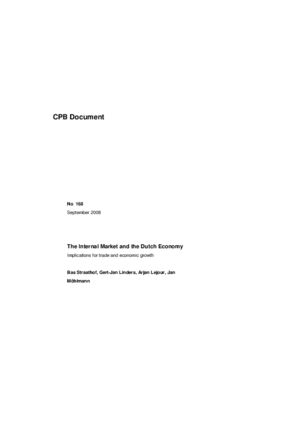The internal market and the Dutch economy: implications for trade and economic growth
De Europese Interne Markt levert de Nederlandse burger jaarlijks zo'n 2000 euro op
We are sorry, unfortunately there is no English translation of this page.
Contacts

First, gravity equations are estimated to identify the impact of the IM on bilateral trade in goods and services and Foreign Direct Investment (FDI). The results of the first stage show that 8 percent of the exports and imports of goods by the EU members can be attributed to the IM. For services trade, the IM effects are somewhat smaller: about 5 percent of EU members' services trade. The IM has a bigger impact on FDI stocks. For the Netherlands, the IM has about twice as large an effect on trade in goods compared to the results for the EU. For services trade and FDI, the effects are in line with the results for the EU.
Second, the trade-enhancing effect of IM on GDP is estimated. For 2005, IM integration of goods markets has yielded 2 to 3 percent higher per capita income in the EU, and about 4 to 6 percent higher income per capita in the Netherlands. If the current level of integration effects with respect to the IM for goods and services persists, GDP per capita in the long run will increase by about 10 percent in the EU and about 17 percent in the Netherlands.
Downloads
Authors


